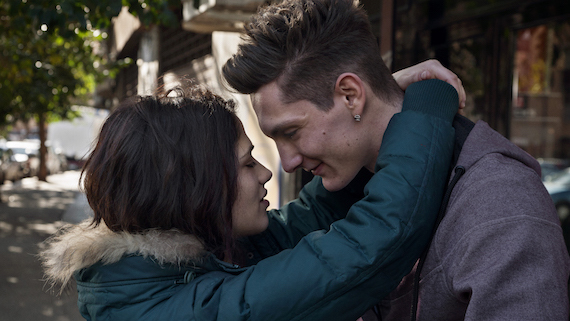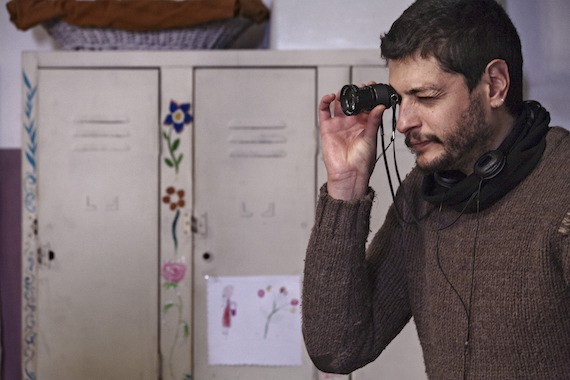One of my favorite activities during the recent BFI London Film Festival -- and there were many, mind you -- was the Filmmaker Afternoon Teas. A series of sessions that felt like speed dating for movie buffs, the Filmmaker Teas combined all the ease of a well organized press junket with amazing food treats and that most soothing of warm beverages, proper English tea.
It was during one of these sessions that I had the chance to meet Italian filmmaker Claudio Giovannesi. Giovannesi is a young, vibrant writer, musician and director responsible for some crucially conscious work. His 2012 film Alì Blue Eyes forecasted or perhaps understood at its very roots the kind of complex dynamics that immigration has created in Italy, the film's title inspired by a poem written by Pier Paolo Pasolini in 1962.
Then it was time for Wolf, a documentary featuring the story of Rabbi Ben Murmelstevin, the director of the Concentration Camp Terezin, a problematic figure for obvious reasons who after being absolved of collaboration with the Nazis, moved to Rome -- only to be marginalized by his community. The story is told via conversations between his son Wolf and psychoanalyst David Meghnagi, who also wrote the story of the film.
In London, Giovannesi was there to screen his Cannes success Fiore, as part of the Italian Cinema at the BFI London Film Festival series featuring young, vibrant voices of contemporary Italian cinema. Fiore is a masterful film, blending realism with romanticism, and packing an emotional punch that lives on in the viewer.
Fiore is the story of two juvenile convicts, a boy and a girl who meet and fall in love behind bars, defying all limitations. While many of us struggle to love within our freedom, it was deeply moving to see how behind bars, enclosed in institutions that discouraged romantic liaisons, Daphne (leading lady Daphne Scoccia) and Josh (played by Joshua Algeri) made love not only a probability but an absolute certainty.
I loved catching up with the deeply intelligent, handsome Giovannesi and hearing his thoughts on Italian cinema, how he found his actors, most of whom are non-professionals, and what he thinks of filmmakers as modern-day prophets.
What do you think when I say that filmmakers are prophets?
Claudio Giovannesi: I think that's a really big thing. I don't feel I'm a prophet, I'd be conceited if I felt like a prophet.
But don't you see the future in a much clearer way than the average human being?
Giovannesi: No. Absolutely not. Actually, I think in my work and my way of life, I see the present.
But with a much clearer view than us.
Giovannesi: Well, clearer, I'm not sure... Cinema and especially the kind of cinema I try to make is based on one thing: the closeness to other human beings, a sense of empathy and the absence of judgement. I work on the present, on this encounter.
The film you've made is one of a filmmaker who doesn't hold any judgement on these kids. Young men and women we see every day and we may even curse them out, because they get in our way.
Giovannesi: Exactly.
Yet you've made them out to be human beings and I know from now on I'll look at "those kids" in a different way. I'll consider your point of view. That's perhaps what I mean by prophetic, someone who changes our vision?
Giovannesi: That makes me happy. It's enough to tell a story that shows that the emotions they live are the same exact ones as those we experience. A thing I don't like is when they say "a social film". Or even worse "a film about marginalization." I hate that.
I would never watch such a film. A film about the marginalized. I mean, we all go to the movies to experience something magical. Otherwise we'd watch the news.
Giovannesi: I agree.
For me cinema is a way to understand "the Other". And most of your films deal with this theme. Do you want to elaborate on that?
Giovannesi: The heart of the film stands in the idea of innocence. A tale of innocence. And we talk about innocence through kids who are guilty in the eyes of the law. But the fact that they are considered legally guilty, I didn't care about that in my film. What interested me was talking about innocence, of emotions and sentiments. Even in the context of being considered guilty by society's standards, which locks them away, it doesn't change that we see through them that human beings all fall in love the same way. The Eros of a teenager is overwhelming even in a jail setting. It's imperative to create a vicissitude with a character that actually society chases away. If I had approached the film by saying "I want to talk about marginalization," I would have taken a step back from them. It's already a judgement that word. And it's not cinema but sociology, which is important but it's not the movies.
We all look to belong, to find someone who understands us.
Giovannesi: Well, yes, and this is a film about the need for love.
The kids you've worked with are not professional actors. In fact, you use their names as the characters' names. How did you find them?
Giovannesi: I tried to find them by looking for the shortest distance between actor and character. So for example, Josh really served three years in jail, in those three years he learned to act because he took a class in it. Daphne wasn't in jail but had some really tough experiences that made her similar to her character. A lot of the other kids were formerly in jail. The choice to work with non-professionals was in fact made to arrive at the truth of each character. Those are kids who are once again reliving experiences they have lived through in their lives.
How is it to be in London, after Cannes, with this film, as part of this showcase of new Italian cinema?
Giovannesi: For me it's a very important festival the London Film Festival, also because I love British cinema. Anyway, it's always best to take the film outside of Italy. It's always more important to take a film outside of Italy, because there is an encounter with the audience that enriches who brings the film as well.
We in Italy always say Italian cinema is dead.
Giovannesi: We've been saying that forever, but this cinema never dies. It's not even half dead, in my opinion it seems really healthy.
Why tell such a feminine tale this time around?
Giovannesi: That was the starting idea. I had just made a really masculine film, all boys and I needed to talk about femininity. For an author, it's always interesting to talk about something we don't really know. That process, which begins with no knowledge at all, and arrives at the completed movie, is what enriches you when you do this kind of work. To talk about a sixteen year-old adolescent, a girl, was great. We Italians are all misogynists, so we must start from this. So we start from misogyny, the fact that we love our mothers way too much, maybe we even love women too much, and then we work on it.
Do you have a single message your audience should take away from Fiore?
Giovannesi: What I wish for, more than a message, is that the film hits an emotional chord. When someone says, "I watched your film and I cried," I feel happy that they cried. It's not that you must learn something, art is not pedagogic, but about feeling empathy with the characters. It's like a circle that closes, from our empathy we felt in writing the film, the empathy we felt in screening it, then if the audience feels the same, it's mission accomplished! If you watched the film and felt nothing, I don't care if you learned something. You shouldn't learn anything but feel closeness to a character that in life would be far from you.
Images courtesy of Premier, used with permission.


